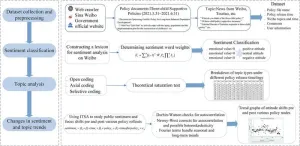(Press-News.org) More than 82% of Americans age 50 to 80 take one or more kinds of prescription medication, and 80% of them say they’d be open to stopping one or more of those drugs if their health care provider gave the green light, a new University of Michigan study shows.
But it’s not as simple as that, the researchers say. They call for prescribers and pharmacists to talk with older adults about their personal situation and figure out if any kind of “deprescribing” is right for them.
The study, published in the Journal of General Internal Medicine, uses data from U-M’s National Poll on Healthy Aging, and builds on a poll report issued in April 2023.
It shows that about 30% of older adults who take medication to address cardiovascular disease or diabetes are most interested in deprescribing these medications. This might be because many of those drugs address symptomless risk factors such as high blood pressure, high cholesterol and high blood sugar.
Left uncontrolled, these risk factors can set the stage for future emergencies and crises. So medications to manage these conditions are important preventive tools.
However, older adults may not immediately feel the benefit of these medications, which may cause them to wonder if they continue to be needed.
In contrast, the study shows that older adults whose prescriptions address conditions that cause symptoms right now — including arthritis pain, mental health conditions and breathing issues —were less interested in stopping those medications.
The new study underscores the importance of comprehensive medication reviews, says Sarah Vordenberg, Pharm.D., M.P.H., the study’s lead author and a clinical associate professor in the U-M College of Pharmacy.
These appointments look at all the medicines and supplements a person is taking, and look for opportunities to safely reduce dosages, costs and the number of times each day a person must take medication.
Medicare pays for such appointments for enrollees who meet eligibility requirements. But the number of older adults taking advantage of this option, even among those who qualify, as evidenced by data from a 2020 report by the National Poll on Healthy Aging.
Condition-specific preferences
The new study goes beyond the 2023 deprescribing poll report by delving into the conditions the poll respondents said they had.
84% of people taking at least one prescription medication said they had some form of cardiovascular condition, which included high blood pressure, and 35% of this group were open to stopping at least one of their cardiovascular medications.
29% of respondents taking at least one medication said they had diabetes, and 30% of this group were open to stopping one of their diabetes medications.
Nearly 50% of the respondents taking prescription medication said they have arthritis, but only 17% of this group were open to stopping a medication for that condition.
22% of those taking prescription medication said they had a brain-related condition affecting their mental health or cognition, and 19% of them were open to stopping a medication they take for it.
11% of prescription drug users said they had a lung disease such as asthma or chronic obstructive pulmonary disease. Of them, 11% said they would be open to stopping a drug they take for it.
“With guidelines changing for the use of cardiovascular risk-reducing medications as we learn more about who gets the most benefit, it’s important that patients and providers talk openly and regularly about what’s best for their individual circumstances,” says Jeffrey Kullgren, M.D., M.P.H., M.S., an associate professor of internal medicine at Michigan Medicine and physician and researcher at the VA Ann Arbor Healthcare System.
“The same goes for diabetes-related medication, especially with the rise of direct-to-consumer services including for GLP-1 inhibitor medications,” he added. “And with any prescription medication or supplement for any condition, it’s critical for your health care providers to know everything you’re taking, no matter how you’re getting it.”
For more about the poll, which is based at the U-M Institute for Healthcare Policy and Innovation and funded by AARP and Michigan Medicine, U-M’s academic medical center, visit https://www.healthyagingpoll.org/
For more about other deprescribing research by Vordenberg and colleagues, visit https://ihpi.umich.edu/news/why-patients-say-they-want-take-fewer-prescription-meds-wont-when-offered-0
In addition to Vordenberg and Kullgren, the new study’s authors are poll team members Matthias Kirch M.S., Dianne Singer M.P.H., Erica Solway Ph.D., M.S.W., M.P.H., and J. Scott Roberts Ph.D., and Brian J. Zikmund-Fisher Ph.D., of the Center for Behavioral and Social Sciences in Medicine. Roberts and Zikmund-Fisher are faculty in the U-M School of Public Health; they and Vordenberg and Kullgren are members of IHPI.
Citation: Interest in Medication Deprescribing Among US Adults Aged 50–80. J GEN INTERN MED (2024). DOI:10.1007/s11606-024-08945-x
END
Older adults want to cut back on medication, but study shows need for caution
Many with heart issues or diabetes say they’d like to take less medication -- but pharmacists and prescribers need to offer personalized guidance for deprescribing, researchers say
2024-07-24
ELSE PRESS RELEASES FROM THIS DATE:
Nationwide flood models poorly capture risks to households and properties
2024-07-24
Irvine, Calif., July 24, 2024 – Government agencies, insurance companies and disaster planners rely on national flood risk models from the private sector that aren’t reliable at smaller levels such as neighborhoods and individual properties, according to researchers at the University of California, Irvine.
In a paper published recently in the American Geophysical Union journal Earth’s Future, experts in UC Irvine’s Department of Civil and Environmental Engineering caution that relatively new, nation-scale flood data provides an inadequate representation of local topography and infrastructure, factors known to control the spread of floods ...
Does your body composition affect your risk of dementia or Parkinson’s?
2024-07-24
MINNEAPOLIS – People with high levels of body fat stored in their belly or arms may be more likely to develop diseases like Alzheimer’s and Parkinson’s than people with low levels of fat in these areas, according to a study published in the July 24, 2024, online issue of Neurology®, the medical journal of the American Academy of Neurology. The study also found that people with a high level of muscle strength were less likely to develop these diseases than people with low muscle strength.
“These neurodegenerative diseases like Alzheimer’s and Parkinson’s affect over 60 million people worldwide, and that number is expected ...
Researchers discover faster, more energy-efficient way to manufacture an industrially important chemical
2024-07-24
Polypropylene is a common type of plastic found in many essential products used today, such as food containers and medical devices. Because polypropylene is so popular, demand is surging for a chemical used to make it. That chemical, propylene, can be produced from propane. Propane is a natural gas commonly used in barbeque grills.
Scientists from the U.S. Department of Energy’s (DOE) Argonne National Laboratory and Ames National Laboratory report a faster, more energy-efficient way to manufacture propylene than the process currently used.
Converting propane into propylene ...
AI model identifies certain breast tumor stages likely to progress to invasive cancer
2024-07-24
Ductal carcinoma in situ (DCIS) is a type of preinvasive tumor that sometimes progresses to a highly deadly form of breast cancer. It accounts for about 25 percent of all breast cancer diagnoses.
Because it is difficult for clinicians to determine the type and stage of DCIS, patients with DCIS are often overtreated. To address this, an interdisciplinary team of researchers from MIT and ETH Zurich developed an AI model that can identify the different stages of DCIS from a cheap and easy-to-obtain breast tissue image. Their model shows that both the state and arrangement ...
Researchers are closing in on a mouse model for late-onset Alzheimer’s
2024-07-24
Mice don’t get Alzheimer’s—and while that’s good news for mice, it’s a big problem for biomedical researchers seeking to understand the disease and test new treatments. Now, researchers at The Jackson Laboratory are working to create the first strain of mice that’s genetically susceptible to late-onset Alzheimer’s, with potentially transformative implications for dementia research.
In humans, two of the defining traits of Alzheimer’s disease are amyloid plaques between brain cells, and tangles of tau proteins within neurons. In mice, however, intercellular ...
New analysis offers most comprehensive roadmap to date for more targeted Alzheimer’s research and drug discovery
2024-07-24
From studying the human genome, to analyzing the way proteins are encoded, or monitoring RNA expression, researchers are rapidly gaining a far richer understanding of the complex genetic and cellular mechanisms that underpin dementia. But there’s a catch: While new technologies are revealing myriad avenues for Alzheimer’s research, it’s impossible to know in advance which research pathways will lead to effective treatments.
“We have countless potential targets, but we don’t know which ones to aim at,” said Greg Carter, the Bernard and Lusia Milch Endowed Chair at the ...
Hens blush when they are scared or excited
2024-07-24
Hens fluff their head feathers and blush to express different emotions and levels of excitement, according to a study publishing July 24, 2024, in the open-access journal PLOS ONE by Cécile Arnould and colleagues from INRAE and CNRS, France.
Facial expressions are an important part of human communication that allow us to convey our emotions. Scientists have found similar signals of emotion in other mammals such as dogs, pigs and mice. Although birds can produce facial expressions by moving their head feathers and flushing their skin, it is unclear whether they express emotions in this way. To investigate, researchers filmed ...
Weibo posts illuminate public response to China’s three-child policy measures
2024-07-24
An analysis of comments on Chinese social media platform Sina Weibo reveals trends in the public response to measures implemented to support China’s three-child policy, highlighting concerns about women’s rights and employment. Lijuan Peng of Zhejiang Gongshang University in Hangzhou, China, and colleagues present these findings in the open-access journal PLOS ONE on July 24, 2024.
For decades, China’s one-child policy restricted most families to having just one child. In 2021, to combat a falling birthrate, China introduced its three-child policy, allowing couples to have up to three children. To help encourage childbirth, ...
Our ability to recognize music might not diminish with age, with older concert attendees identifying themes in music as well as younger participants
2024-07-24
Our ability to recognize music might not diminish with age, with older concert attendees identifying themes in music as well as younger participants
###
Article URL: https://journals.plos.org/plosone/article?id=10.1371/journal.pone.0305969
Article Title: Age and familiarity effects on musical memory
Author Countries: Canada, UK
Funding: The author(s) disclosed receipt of the following financial support for the research, authorship, and/or publication of this article: this work was supported by BRZ’s Natural Sciences and Engineering Research Council of Canada grant. The funders had no role ...
The COVID-19 pandemic slowed progress towards health-related Sustainable Development Goals and increased inequalities
2024-07-24
The COVID-19 pandemic significantly widened existing economic and health disparities between wealthy and low-income countries and slowed progress toward health-related Sustainable Development Goals (SDGs), according to a new study published July 24, 2024, in the open-access journal PLOS ONE by Wanessa Miranda of Federal University of Minas Gerais, Brazil, and colleagues.
The global SDGs were established in 2015 as a wide and integrated agenda with themes ranging from eradicating poverty and promoting well-being to addressing socioeconomic ...
LAST 30 PRESS RELEASES:
Under the Lens: Microbiologists Nicola Holden and Gil Domingue weigh in on the raw milk debate
Science reveals why you can’t resist a snack – even when you’re full
Kidney cancer study finds belzutifan plus pembrolizumab post-surgery helps patients at high risk for relapse stay cancer-free longer
Alkali cation effects in electrochemical carbon dioxide reduction
Test platforms for charging wireless cars now fit on a bench
$3 million NIH grant funds national study of Medicare Advantage’s benefit expansion into social supports
Amplified Sciences achieves CAP accreditation for cutting-edge diagnostic lab
Fred Hutch announces 12 recipients of the annual Harold M. Weintraub Graduate Student Award
Native forest litter helps rebuild soil life in post-mining landscapes
Mountain soils in arid regions may emit more greenhouse gas as climate shifts, new study finds
Pairing biochar with other soil amendments could unlock stronger gains in soil health
Why do we get a skip in our step when we’re happy? Thank dopamine
UC Irvine scientists uncover cellular mechanism behind muscle repair
Platform to map living brain noninvasively takes next big step
Stress-testing the Cascadia Subduction Zone reveals variability that could impact how earthquakes spread
We may be underestimating the true carbon cost of northern wildfires
Blood test predicts which bladder cancer patients may safely skip surgery
Kennesaw State's Vijay Anand honored as National Academy of Inventors Senior Member
Recovery from whaling reveals the role of age in Humpback reproduction
Can the canny tick help prevent disease like MS and cancer?
Newcomer children show lower rates of emergency department use for non‑urgent conditions, study finds
Cognitive and neuropsychiatric function in former American football players
From trash to climate tech: rubber gloves find new life as carbon capturers materials
A step towards needed treatments for hantaviruses in new molecular map
Boys are more motivated, while girls are more compassionate?
Study identifies opposing roles for IL6 and IL6R in long-term mortality
AI accurately spots medical disorder from privacy-conscious hand images
Transient Pauli blocking for broadband ultrafast optical switching
Political polarization can spur CO2 emissions, stymie climate action
Researchers develop new strategy for improving inverted perovskite solar cells
[Press-News.org] Older adults want to cut back on medication, but study shows need for cautionMany with heart issues or diabetes say they’d like to take less medication -- but pharmacists and prescribers need to offer personalized guidance for deprescribing, researchers say




